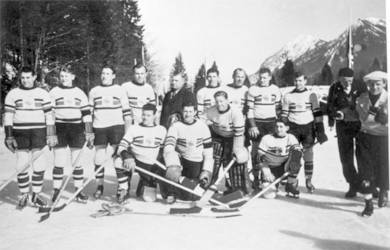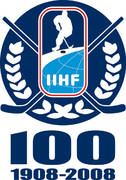

Story #15 Great Britain wins Olympic goldFebruary 15, 1936 — Garmisch-Partenkirchen, Germany
It was an Olympics coated in sportive controversy and by the presence of Adolf Hitler, who used the global sports event as a propaganda tool, three years before the outbreak of the biggest catastrophe in the history of mankind. In the end, history shows that Canada lost the gold medal and Great Britain won. The process to that result, however, was anything but simple. Canada was represented by the Port Arthur Bear Cats and, of course, the team was heavily favoured to win the gold. Canada had won Olympic gold in 1920, ’24, ’28, and ’32, and had lost only one meaningful game in international hockey history, that to the USA in the finals of the 1933 World Championship.  Canadian official P.J. Mulqueen called it "one of the worst manipulations in sporting history," and The Times editorial agreed, saying euphemistically, "it is regrettable that the Olympic hockey committee didn't publicly announce the regulations governing the tournament." Upon returning to native soil, however, some of the Canadian players placed responsibility for the format confusion on their own officials. Left winger Ralph St. Germain said plainly: "The Olympic rules state that the hockey may be played either on an elimination or point system or both. Either through carelessness or dumbness, the officials neglected to find out what system was being used until after we were defeated by England." About the Top 100 StoriesAs part of the IIHF's 100th anniversary celebrations, www.IIHF.com is featuring the 100 top international hockey stories from the past century (1908-2008). Starting now and continuing through the 2008 IIHF World Championships in Canada, we will bring you approximately three stories a week counting down from Number 100 to Number 11.
The Final Top 10 Countdown will be one of the highlights of the IIHF's Centennial Gala Evening in Quebec City on May 17, the day prior to the Gold Medal Game of the 2008 World Championship.
These are the criteria for inclusion on this list: First, the story has to have had a considerable influence on international hockey. Second, it has to have had either a major immediate impact or a long-lasting significance on the game. Third, although it doesn't necessarily have to be about top players, the story does have to pertain to the highest level of play, notably Olympics, World Championships, and the like. The story can be about a single moment — a goal, a great save, a referee's call — or about an historic event of longer duration — a game, series, tournament, or rule change. |
 Click here for the 100 Top Stories
|
|






